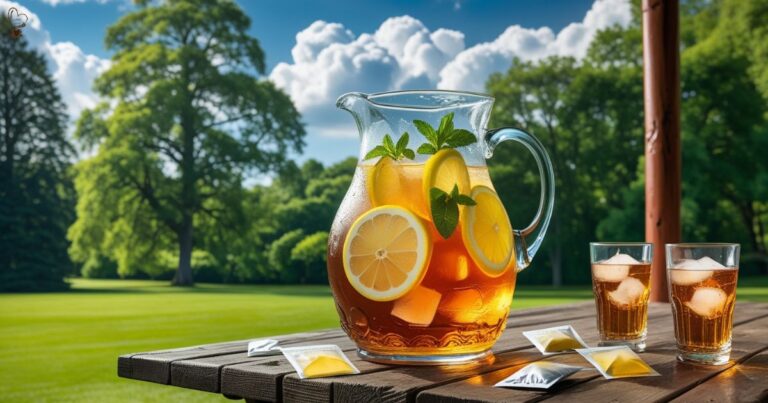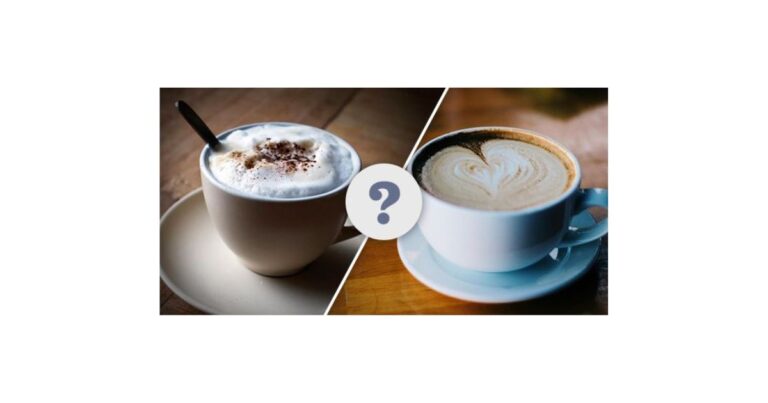Does White Tea Contain Caffeine? 7 Shocking Facts You Need to Know!
White tea is often praised for its delicate taste and health benefits, but have you ever wondered, “Does white tea contain caffeine?” Many assume it contains little to no caffeine, making it a perfect low-energy drink.
However, this isn’t entirely true. While white tea typically has less caffeine than black tea, some varieties can contain as much caffeine as green tea—or even more! Caffeine levels in white tea vary based on the type of leaves used, how they’re processed, and how you brew your tea.
If you love tea but want to manage your caffeine intake, this guide will give you everything you need to know about white tea caffeine content and how to brew it to suit your preference.
What is White Tea?
White tea comes from the Camellia sinensis plant, just like green, oolong, and black tea. However, it’s the least processed among them, which is why it has such a light and floral taste. White tea is made from the youngest tea buds and leaves, which are simply dried and withered rather than fermented or oxidized.

Because of this minimal processing, white tea retains high levels of antioxidants and a more delicate flavor profile. However, it also means that caffeine content isn’t necessarily lower than other teas. Some varieties, such as Silver Needle white tea, can have almost as much caffeine as green tea!
Does White Tea Contain Caffeine?
So, the big question: does white tea have caffeine? The answer is yes, but the amount varies depending on the type of white tea, the part of the plant used, and how it’s brewed.
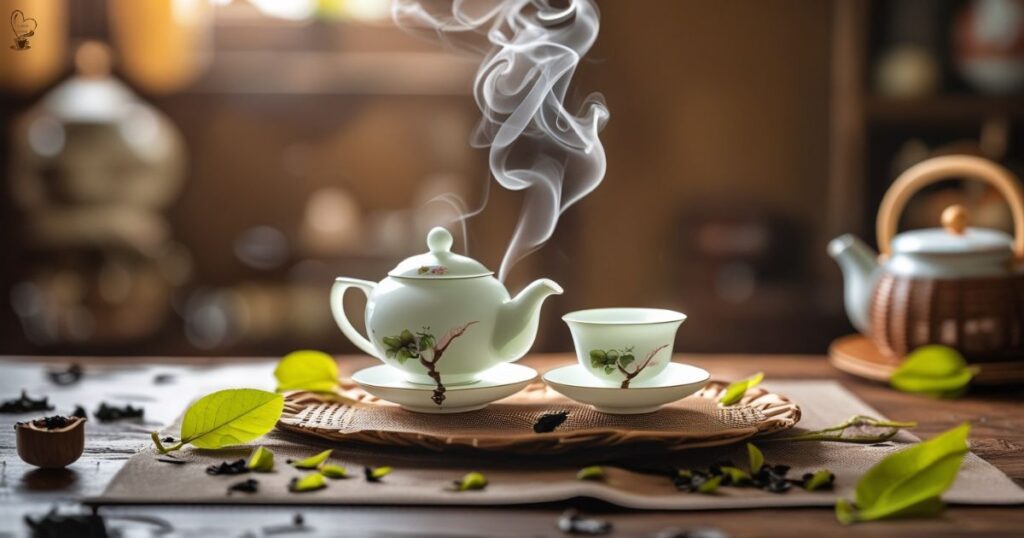
This leads to another common question: Does sweet tea have caffeine? The answer depends on the type of tea used to make it. Traditional sweet tea, made from black tea, contains caffeine, often ranging from 40-90 mg per cup. However, if sweet tea is made with white or herbal tea, its caffeine content may be significantly lower or even caffeine-free.
Factors That Affect White Tea Caffeine Levels
✔️ Type of white tea – Some white teas naturally contain more caffeine than others.
✔️ Leaf maturity – Young buds (like in Silver Needle) have more caffeine than older leaves.
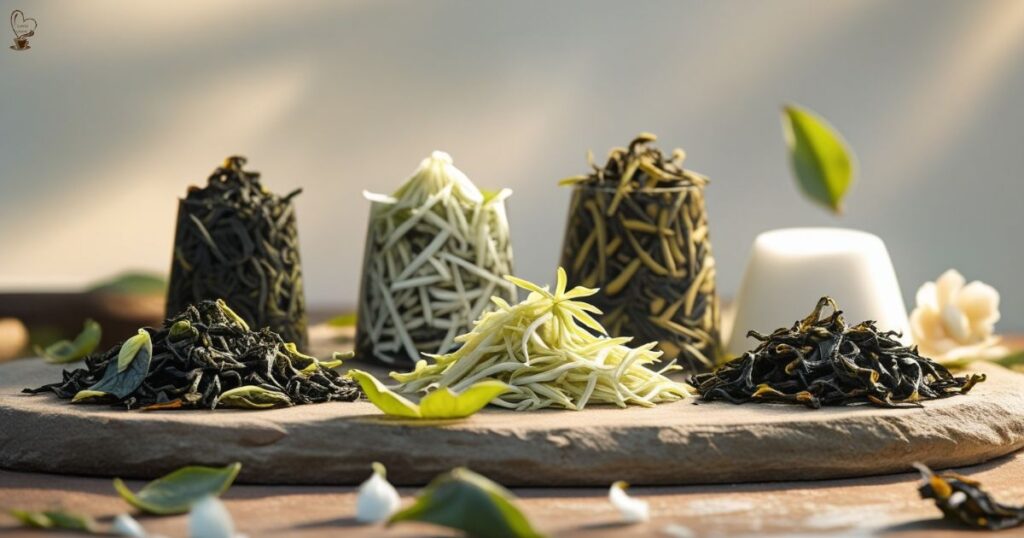
✔️ Brewing method – Longer steeping and hotter water extract more caffeine in white tea.
✔️ Loose-leaf vs. tea bags – Loose-leaf white tea generally has less caffeine because it contains larger leaves that release caffeine more slowly.
If you’re sensitive to caffeine, try brewing white tea for a shorter time with cooler water to reduce the caffeine content.
How Much Caffeine is in Tea?
If you’re trying to cut back on caffeine or just want to know how much you’re consuming, here’s a quick comparison of different tea types.
Caffeine Levels in Different Teas
| Tea Type | Caffeine per Cup (8 oz) |
|---|
| White Tea | 15 – 50 mg |
| Green Tea | 30 – 70 mg |
| Oolong Tea | 35 – 75 mg |
| Black Tea | 40 – 90 mg |
| Matcha Tea | 60 – 120 mg |
| Coffee | 95 – 200 mg |
✔️ Does tea have more caffeine than coffee? No, coffee typically contains much more caffeine than any type of tea.
✔️ What tea has the most caffeine? Matcha and black tea have the highest caffeine content.
✔️ White tea caffeine content can vary, but it’s often lower than black and green tea.
White Tea Varieties & Their Caffeine Levels
Not all white teas have the same caffeine content. While some are known for their light and mild nature, others can have surprisingly high levels of caffeine, comparable to green or even black tea.

If you’re looking to customize your caffeine intake, understanding the differences between white tea varieties can help you choose the right one.Here’s a breakdown of popular white tea varieties and how they differ in flavor, caffeine content, and benefits.
Kenya Silverback White Tea
✔️ Caffeine Level: High (Comparable to green tea)
✔️ Flavor Profile: Rich, malty, and slightly nutty
✔️ Best For: Those looking for a stronger caffeine kick

Kenya Silverback White Tea is one of the boldest and most caffeinated white teas available. Unlike traditional Chinese white teas, which are known for their delicate flavors, this Kenyan variety has a fuller body and robust taste. It is made from high-grown tea plants, which naturally retain more caffeine due to extended exposure to the sun.
This white tea is an excellent choice for morning tea drinkers who want a smoother alternative to black tea without sacrificing caffeine content. If you’re trying to cut back on coffee but still need a strong pick-me-up, Kenya Silverback is a great option.
White Peony White Tea
✔️ Caffeine Level: Mild (Less than green tea, but still stimulating)
✔️ Flavor Profile: Sweet, floral, with hints of honey
✔️ Best For: A balanced, gentle energy boost

White Peony (Bai Mu Dan) is a widely popular white tea that contains both young buds and mature leaves, giving it a well-rounded flavor with slightly more body than Silver Needle.
Since it includes more mature leaves, its caffeine content is lower than Silver Needle and Kenya Silverback, making it an ideal choice for afternoon tea or those who want a mild caffeine tea that won’t cause jitters.
The antioxidants in White Peony tea are excellent for skin health and overall well-being, making it a go-to tea for relaxation and beauty benefits.
Himalayan Spring White Tea
✔️ Caffeine Level: Moderate
✔️ Flavor Profile: Light, floral, and crisp with a hint of citrus
✔️ Best For: A refreshing, mid-day energy boost

Grown in the high-altitude tea gardens of Nepal and India, Himalayan Spring White Tea offers a refreshing and slightly brisk taste. The cool mountain air slows the growth of the tea leaves, helping them develop a complex flavor while maintaining moderate caffeine levels.
Himalayan white tea is perfect for those who want a crisp and energizing tea without overpowering caffeine content. It is also rich in antioxidants, helping to boost immunity and digestion.
Jasmine Silver Needle White Tea
✔️ Caffeine Level: Higher than average white tea
✔️ Flavor Profile: Floral, delicate, with a natural jasmine aroma
✔️ Best For: A relaxing, aromatic tea experience with a caffeine boost
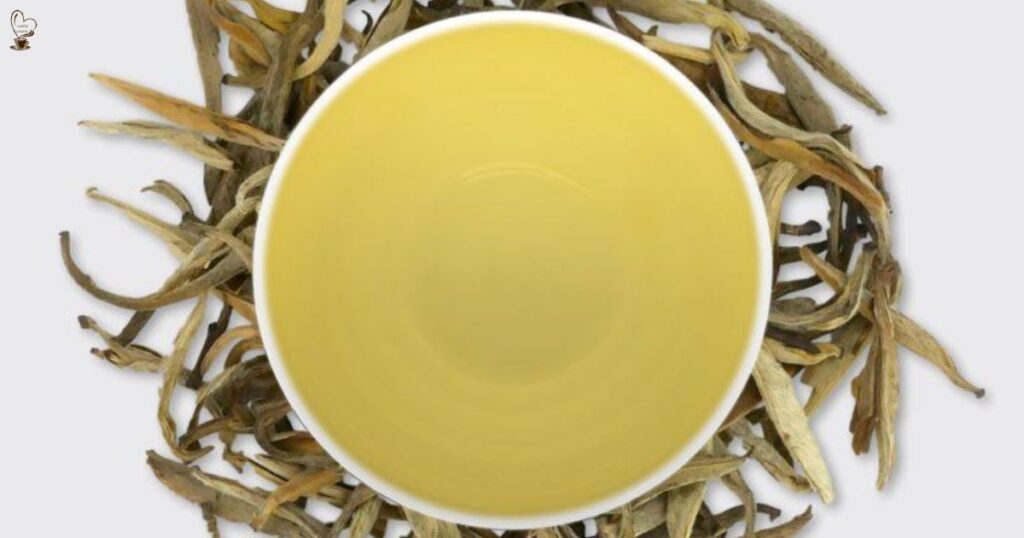
Jasmine Silver Needle is one of the most luxurious white teas, infused with natural jasmine blossoms. While it has a soothing and delicate taste, don’t be fooled—this tea packs a decent caffeine punch. Because it’s made using young tea buds, it contains more caffeine than White Peony or Himalayan Spring tea.
If you enjoy floral teas but still want an energy boost, this is a fantastic choice. It offers a unique combination of relaxation (thanks to jasmine) and alertness (due to caffeine), making it a perfect tea for focus and productivity.
Mango Pear White Tea
✔️ Caffeine Level: Low
✔️ Flavor Profile: Sweet, fruity, with a tropical aroma
✔️ Best For: A refreshing, caffeine-light tea option

Mango Pear White Tea is a flavored white tea blend, meaning it contains less caffeine than pure white teas. The addition of dried fruits and natural flavorings dilutes the caffeine concentration, making it an excellent choice for those looking for a low-caffeine white tea.
This tea is perfect for warm weather, as it can be enjoyed hot or iced. It’s naturally sweet and does not require additional sweeteners, making it a healthy alternative to sugary drinks.
Peachy Keen White Tea
✔️ Caffeine Level: Low to Moderate
✔️ Flavor Profile: Smooth, sweet, and slightly tangy
✔️ Best For: A fruity white tea option with mild caffeine
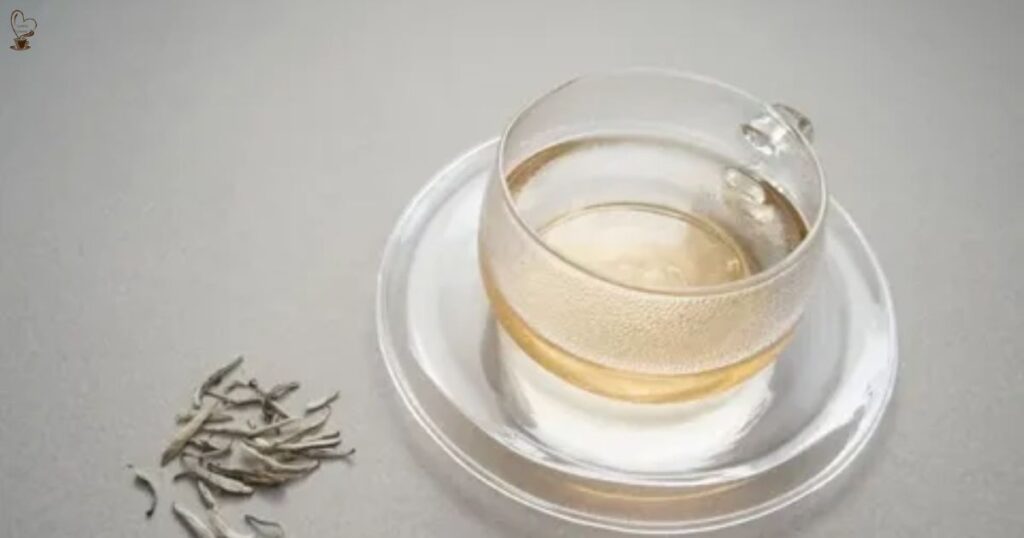
Similar to Mango Pear White Tea, Peachy Keen is a flavored white tea, but with a slightly richer taste. The peach notes complement the soft floral undertones of white tea, creating a refreshing and uplifting drink.
Since it’s blended with fruit, its caffeine levels are lower than traditional white teas, making it an excellent afternoon or evening tea for those who want a hint of caffeine without overstimulation.
Spring Fancy White & Green Tea
✔️ Caffeine Level: Moderate
✔️ Flavor Profile: A balance of floral white tea and grassy green tea
✔️ Best For: A well-rounded tea with the benefits of both white and green tea

Spring Fancy White & Green Tea is a blend of white and green tea, creating a perfect middle ground for those who want a tea that’s not too strong, but not too weak either. The green tea component increases caffeine levels, making this blend more stimulating than traditional white teas.
This tea offers the best of both worlds—the lightness and antioxidants of white tea, combined with the metabolism-boosting properties of green tea.
7 Shocking Facts About White Tea Caffeine Content
💡 Fact #1: White Tea Has Less Caffeine Than Black Tea… But Not Always!
Some white teas, like Silver Needle, can have just as much caffeine as green tea, depending on how they’re brewed.
💡 Fact #2: Younger Leaves Contain More Caffeine
Tea buds (like in Silver Needle) naturally have higher caffeine levels than mature leaves (like in White Peony).
💡 Fact #3: The Longer You Steep, the More Caffeine You Get
Steeping white tea for 5+ minutes extracts significantly more caffeine than shorter steeping times.
💡 Fact #4: Some White Teas Contain More Caffeine Than Green Tea
It’s a common myth that all white teas are low in caffeine—certain types actually contain more caffeine than some green teas!
💡 Fact #5: White Tea Provides a Smoother Energy Boost
The amino acid L-theanine in white tea reduces caffeine jitters and promotes calm focus. But if you’re sensitive to caffeine, you might wonder: Can caffeine cause dizziness? Some people experience dizziness, jitters, or restlessness after consuming caffeine, so it’s essential to monitor your intake.
💡 Fact #6: Decaffeinated White Tea Exists, But It Loses Some Benefits
Removing caffeine from white tea can also strip away some of its antioxidants, reducing its overall health benefits.
💡 Fact #7: Brewing Method Affects Caffeine Levels
Want less caffeine? Use cooler water (160-175°F) and steep for just 2-3 minutes.
How to Brew White Tea to Control Caffeine Levels
✔️ Use hot but not boiling water (160-185°F).
✔️ Steep for 2-3 minutes for a lighter caffeine boost.

✔️ For more caffeine, steep longer (4-5 minutes).
✔️ Avoid tea bags if you want less caffeine, as they contain smaller, more broken tea leaves that release caffeine faster.
Final Thoughts: Should You Choose White Tea?
White tea is a great choice if you want a gentle caffeine boost while still enjoying the delicate flavors and health benefits of tea. Does white tea contain caffeine? Yes, but how much depends on the variety you choose and how you brew it.
If you prefer more caffeine, go for Silver Needle white tea. If you want a milder option, White Peony is perfect. White tea is not only delicious but also rich in antioxidants, great for skin health, and a natural way to stay energized.
FAQs About White Tea and Caffeine
Is White Tea High in Caffeine?
White tea is generally lower in caffeine than black or green tea, but its caffeine content can vary significantly. Depending on the variety and brewing method, it can range from 5-55 mg per cup. Lighter brews tend to have less caffeine, while stronger, longer-steeped teas can have higher amounts.
Which Tea is Lowest in Caffeine?
The lowest caffeine teas are typically herbal teas, as they contain no caffeine at all. Among true teas, white tea (especially White Peony) and lightly brewed green tea have the least caffeine. For a completely caffeine-free option, rooibos, chamomile, and peppermint tea are great choices.
Does White Tea Keep You Awake?
White tea contains caffeine, so it can potentially keep you awake if consumed late in the evening. While it has less caffeine than black or green tea, it may still disrupt sleep, especially for those sensitive to caffeine. To avoid insomnia, it’s best to drink white tea earlier in the day.
Is White tea the Healthiest?
White tea is considered one of the healthiest teas due to its high antioxidant content. Studies have linked it to improved heart health, better skin, and boosted metabolism. Its minimal processing helps retain more nutrients than other teas, making it a great choice for overall well-being.
Which Tea is Highest in Caffeine?
Among traditional teas, black tea has the highest caffeine content, typically ranging from 40-90 mg per cup. However, matcha green tea can contain even more caffeine due to its powdered form. If you’re looking for a strong caffeine boost, black or matcha tea are the best choices.


